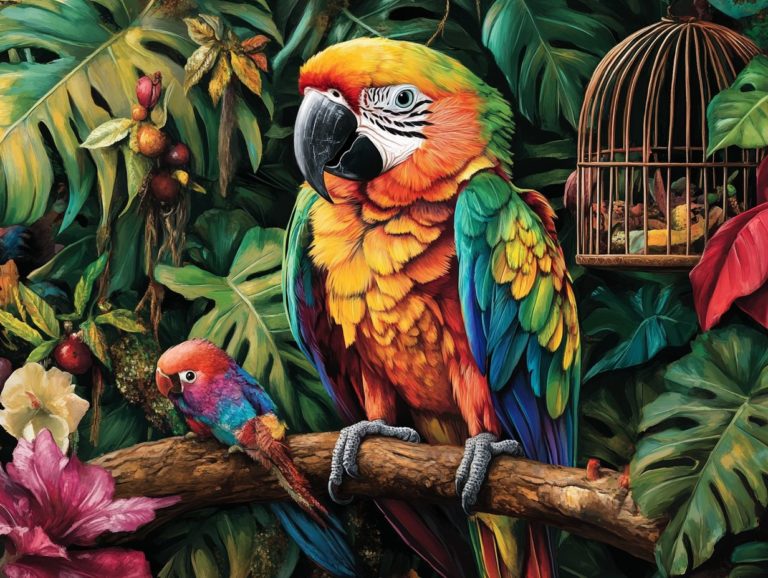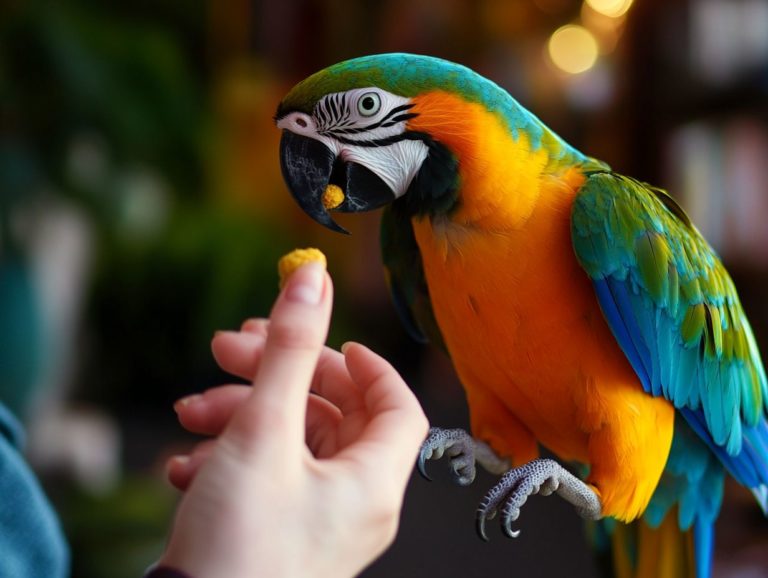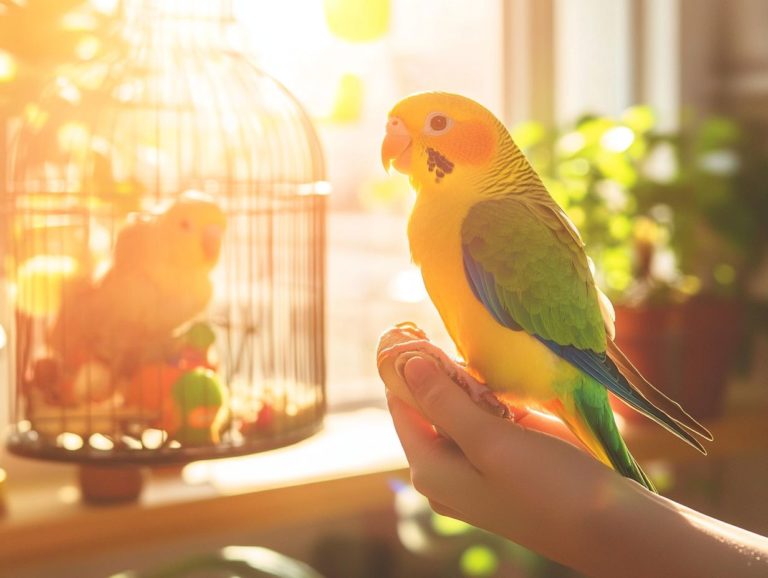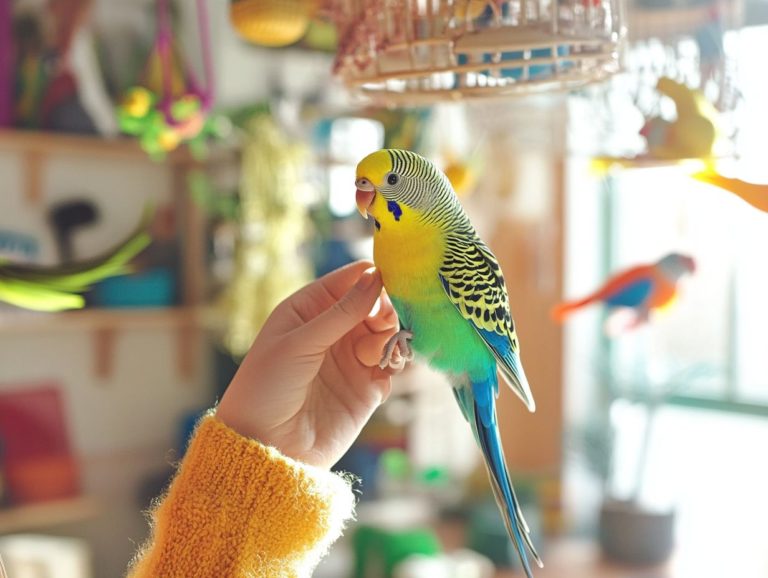What Do I Need to Know About Bird Vaccinations?
Bird vaccinations are vital for ensuring the health and wellbeing of your feathered companions.
There are different types of vaccines for birds. Understanding the difference between live and killed vaccines is important for good care. This article delves into common vaccines for birds, outlining the benefits of vaccination and best practices for administering them.
It also discusses the best times to vaccinate birds and highlights crucial considerations, including potential risks. Your bird s health is an investment worth making let s uncover the best ways to safeguard it.
Contents
Key Takeaways:
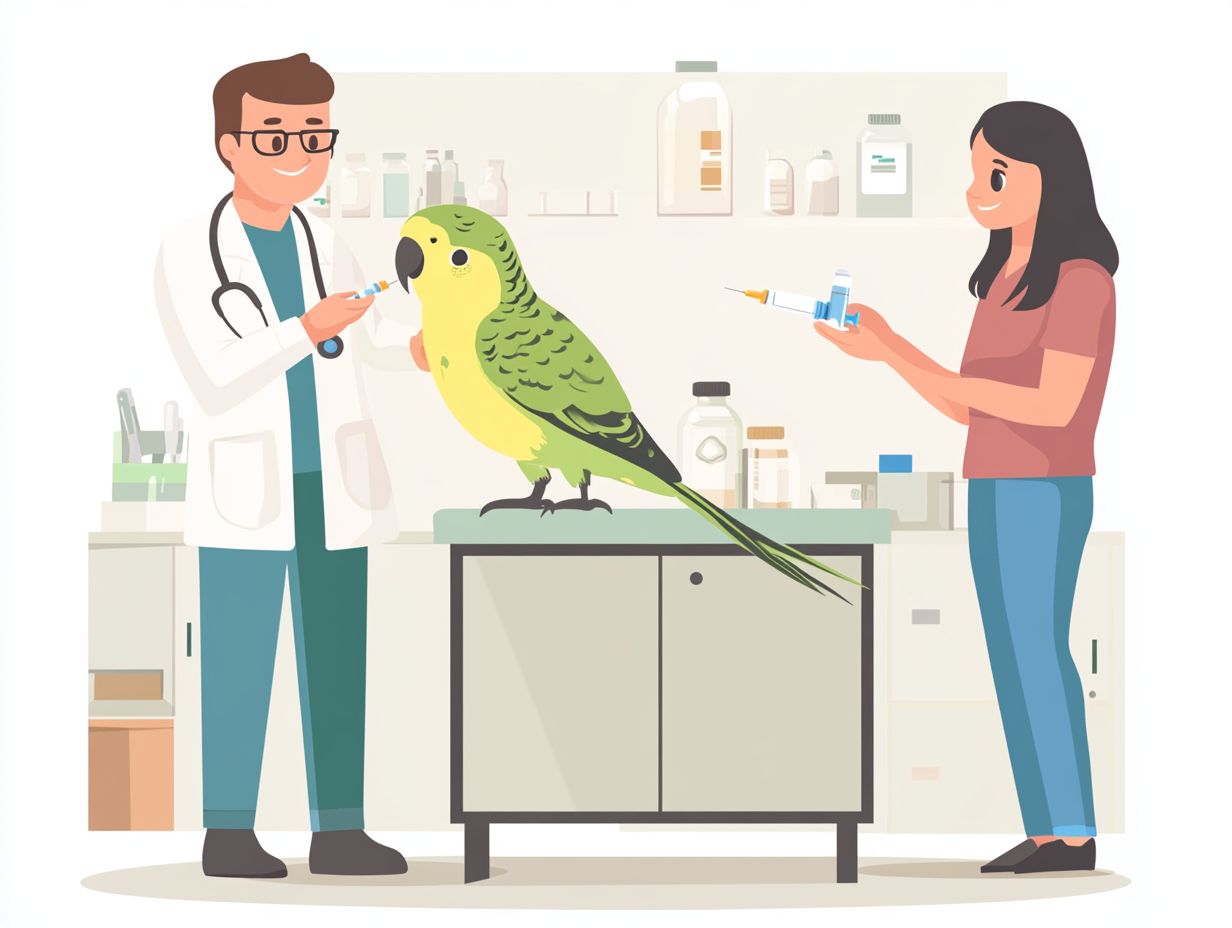
- Bird vaccinations can prevent common diseases and protect the entire flock.
- There are two types of bird vaccines: live and killed, each with different benefits and considerations.
- Vaccinating birds requires proper technique and safety measures, and should be done at the right age and frequency to be effective.
What are Bird Vaccinations?
Bird vaccinations serve as essential preventive measures to protect birds from various viral infections, particularly the notorious bird flu, scientifically known as H5N1. These vaccines are a critical component of public health strategies aimed at curbing the spread of avian influenza in both domestic and wild bird populations.
Health experts stress the importance of vaccinating birds to prevent outbreaks that could pose risks to humans and livestock, underscoring the connections between animal health and human safety.
Types of Bird Vaccines
Understanding the various types of bird vaccines is essential for effective disease management and prevention. The primary categories, live and killed vaccines, are designed to provoke a robust immune response against specific viruses, including the H5N1 avian influenza virus.
It’s crucial to tailor vaccines to address the unique challenges posed by seasonal flu and other viral infections that can jeopardize bird populations.
Live vs. Killed Vaccines
The debate between live and killed vaccines plays a pivotal role in avian health management, particularly in preventing diseases like H5N1 and seasonal flu. Live vaccines often provoke a stronger immune response, offering long-lasting protection. However, killed vaccines are generally safer to administer and present a lower risk of spreading infections. Each type has its pros and cons, so careful consideration based on the specific health needs of your bird populations is essential.
When determining which vaccine to use, evaluate the age, health, and environment of your birds. Live vaccines, while effective, require caution, as they may lead to mild infections this can be problematic for stressed or immunocompromised populations. On the flip side, killed vaccines are safer and can be administered to younger or weakened birds, though they typically require multiple doses to achieve adequate immunity.
The implications for immune response also vary; live vaccines can stimulate both humoral and cellular immunity effectively, while killed vaccines primarily elicit an antibody response. It s crucial for you whether you’re a veterinarian or a poultry manager to weigh these factors carefully when formulating vaccination strategies against threats like H5N1 and seasonal influenza.
Don t wait until it s too late! Protect your feathered friends with the right vaccinations today. Ensure your birds are safe and healthy! Consult your veterinarian about the best vaccinations today.
Essential Vaccines Every Bird Owner Should Know!
Common vaccines administered to birds include essential health safeguards that you should not overlook. Among these is the H5N1 vaccine, which protects against bird flu. The polyomavirus vaccine is also crucial for preventing Pacheco’s disease.
These vaccines are vital for maintaining not only the health of individual birds but also the wellbeing of entire flocks, whether they are domestic or wild. By implementing these vaccinations, you can significantly reduce the risk of outbreaks that might otherwise harm bird populations.
For instance, the H5N1 vaccine is especially critical in areas where bird flu outbreaks have been recorded. It acts as a frontline defense against this potentially devastating virus. The polyomavirus vaccine is also essential in safeguarding susceptible species from the severe impacts of Pacheco’s disease, which can lead to alarming mortality rates.
The effectiveness of these vaccines has been well-documented, giving you reassurance that a proactive approach can protect your avian companions from these pervasive health threats.
Benefits of Bird Vaccinations
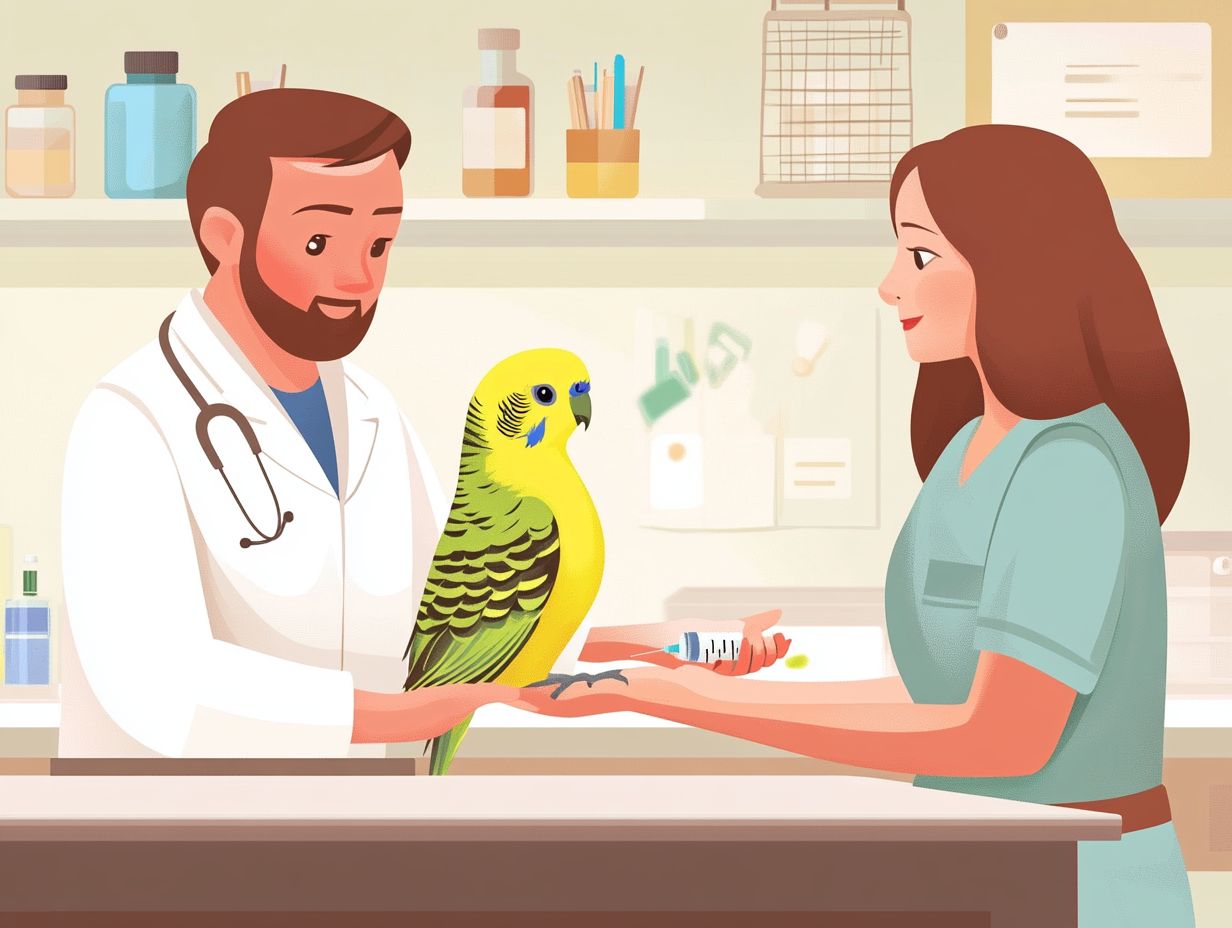
The benefits of bird vaccinations are extensive. They primarily aim at preventing diseases that can significantly impact avian populations. By immunizing birds against infections like H5N1 and other viral threats, you re not only safeguarding individual animals but also enhancing the health of entire flocks and contributing to the broader public health landscape.
Health experts emphasize that vaccination programs are vital components of effective disease management strategies within avian populations.
Preventing Common Diseases
Preventing common diseases in birds, like H5N1 and seasonal flu, should be a primary goal when considering vaccination programs. Act fast! Timely vaccinations can dramatically cut down the risk of disease. Health experts emphasize that these vaccinations can effectively safeguard avian health and prevent potential outbreaks that could impact both animal and human populations.
H5N1, often referred to as bird flu, presents a considerable threat to various bird species. It leads to significant declines in their populations and disrupts ecosystems. Vaccination serves as a critical line of defense against these viruses, helping to contain their spread within both domestic flocks and wild birds.
Monitor your birds closely. Use strong biosecurity measures and educate the public to fight these diseases. By grasping the transmission dynamics of infections and promoting vaccination, you contribute to fostering a more resilient avian community. This ultimately mitigates the risk of spillover events that could pose a threat to humans.
Protecting the Flock
Protecting your flock is a vital aspect of avian health management, especially regarding bird vaccinations against diseases like bird flu. By following vaccination protocols recommended by health experts, you can ensure the overall wellbeing of your flock while minimizing the potential for virus transmission.
Beyond vaccinations, you should adopt comprehensive monitoring practices. Regular health checks and careful observation of your flock s behavior are essential. These strategies enable you to spot early signs of illness, allowing for timely interventions.
Effective management practices, such as maintaining robust biosecurity measures and providing proper nutrition, are crucial in enhancing your flock s resilience against infections. Seeking expert guidance in these areas not only boosts the effectiveness of your vaccination efforts but also ensures you are well-informed and equipped to make decisions that benefit both your flock and the wider community.
When to Vaccinate Birds
Determining the optimal timing for vaccinating birds is crucial to maximizing the effectiveness of your immunization programs. It largely hinges on the age of the birds and the frequency recommended by health experts.
Young birds typically require precise vaccination schedules to develop strong immune responses, especially against formidable diseases like H5N1. Meanwhile, older birds may necessitate booster shots to ensure their immunity remains robust.
Consult your vet today to plan your birds’ vaccination schedule!
Age and Frequency of Vaccinations
The age and frequency of bird vaccinations are essential in maintaining optimal health and preventing diseases like H5N1 and avian influenza. Health experts recommend tailored vaccination schedules that align with your birds’ developmental stages to ensure they mount adequate immune responses and enjoy long-lasting immunity.
These schedules typically kick off shortly after hatching. Initial vaccinations are designed to lay a solid foundation of immunity. As your birds mature, periodic boosters become vital, especially for vaccines that target significant threats like H5N1, which can wreak havoc on avian populations.
You ll notice that the frequency of vaccinations varies by the type of vaccine. Some may call for annual boosters, while others can remain effective for several years. Staying informed about these guidelines is crucial for you as a bird owner, empowering you to consult with avian veterinarians and ensure your feathered companions remain protected throughout their lives.
How to Administer Bird Vaccines
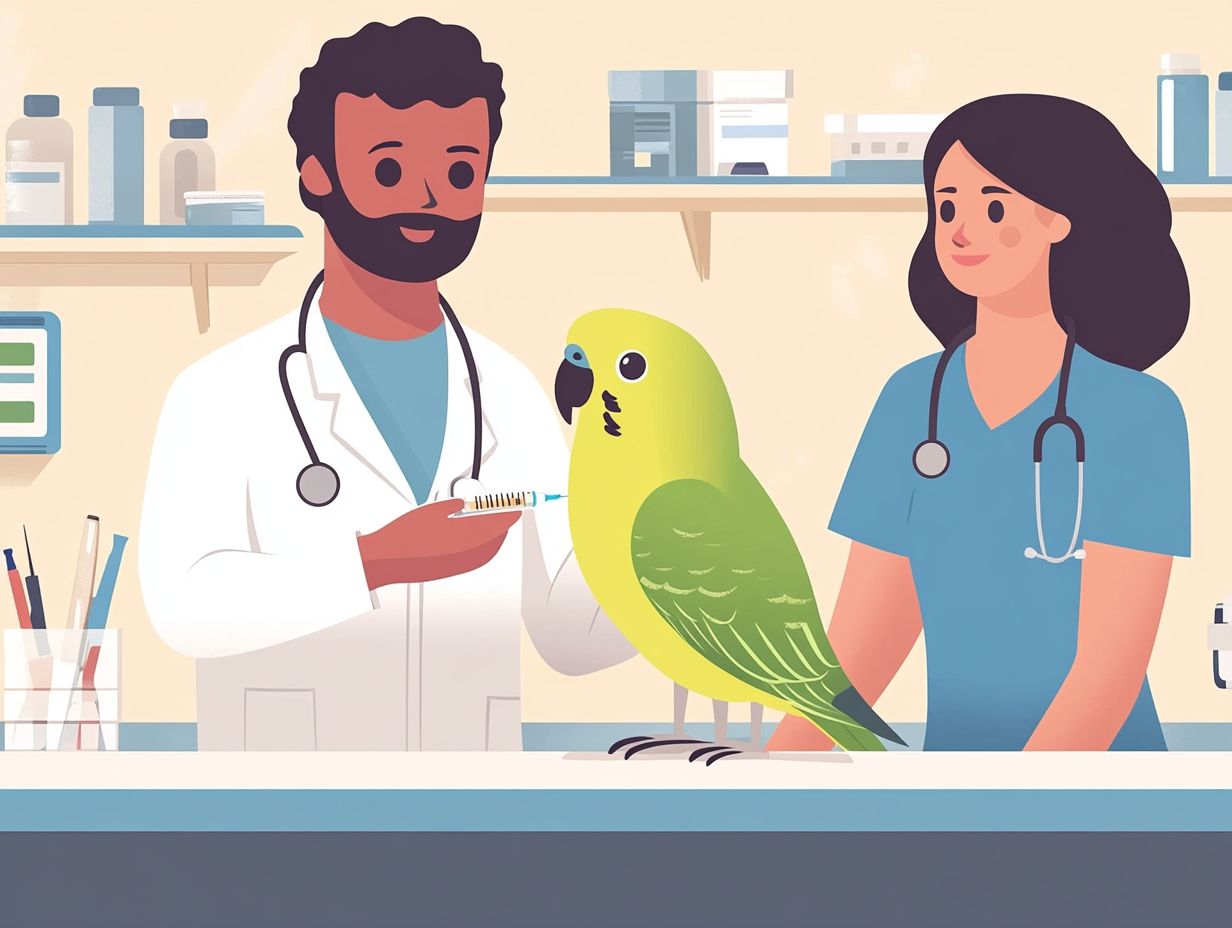
Administering bird vaccines demands your careful attention to proper technique and safety measures to safeguard the health and well-being of your birds.
Follow precise vaccination protocols. This helps reduce stress for the birds and increases vaccine effectiveness. This entails employing the correct injection techniques and maintaining sterile conditions throughout the process.
Proper Technique and Safety Measures
Implementing the right techniques and safety measures during vaccine administration is essential for ensuring bird health and the effectiveness of the vaccination process. Health experts recommend methods that emphasize the use of appropriate equipment to minimize stress and discomfort for the birds being vaccinated.
To achieve this, it’s crucial for you to utilize sterile syringes and needles specifically designed for avian use. Using these helps keep your birds safe! When handling the birds, prioritize gentleness and calmness to avoid startling them think quiet voices and smooth movements.
Consider preparing a distraction technique, such as offering a favorite treat, to help ease the bird’s anxiety. After vaccination, monitoring for any adverse reactions is equally important. Addressing any issues promptly ensures a swift response to unexpected complications, ultimately safeguarding the health of your birds.
Considerations Before Vaccinating Birds
Before you vaccinate your birds, there are several crucial factors to consider to ensure their welfare and health. It’s essential to understand the potential risks and side effects linked to different vaccines something that health experts strongly advocate for responsible and informed vaccination practices.
By conducting a thorough assessment, you can achieve improved outcomes in disease prevention and enhance the overall health of your birds.
Potential Risks and Side Effects
Understanding the potential risks and side effects of bird vaccinations is crucial for your responsible avian care. Health experts emphasize that while vaccines are generally safe and effective, some birds might experience adverse reactions. These can range from mild soreness to more serious complications, depending on the type of vaccine administered.
This highlights the necessity of monitoring your birds closely after they ve been vaccinated. Keeping an eye out for any signs of discomfort or unusual behavior is essential for addressing complications early on. Common side effects may include lethargy, reduced appetite, or localized swelling at the injection site.
To mitigate these risks, it’s wise to consult with veterinarians to establish a vaccination plan tailored to your birds specific needs. This ensures that you choose the right timing and types of vaccines. By staying informed and vigilant, you can significantly enhance your pets’ safety and well-being, fostering a healthier environment for your avian friends.
Frequently Asked Questions
What vaccines do birds need?
Birds typically need vaccines for diseases like avian influenza and others depending on their environment and exposure risk.
How often should I vaccinate my birds?
The frequency of vaccinations will depend on the type of vaccine used; some require annual boosters while others may last several years.
What are the side effects of bird vaccinations?
Common side effects include mild soreness, lethargy, or reduced appetite following vaccination.
What Do I Need to Know About Bird Vaccinations?
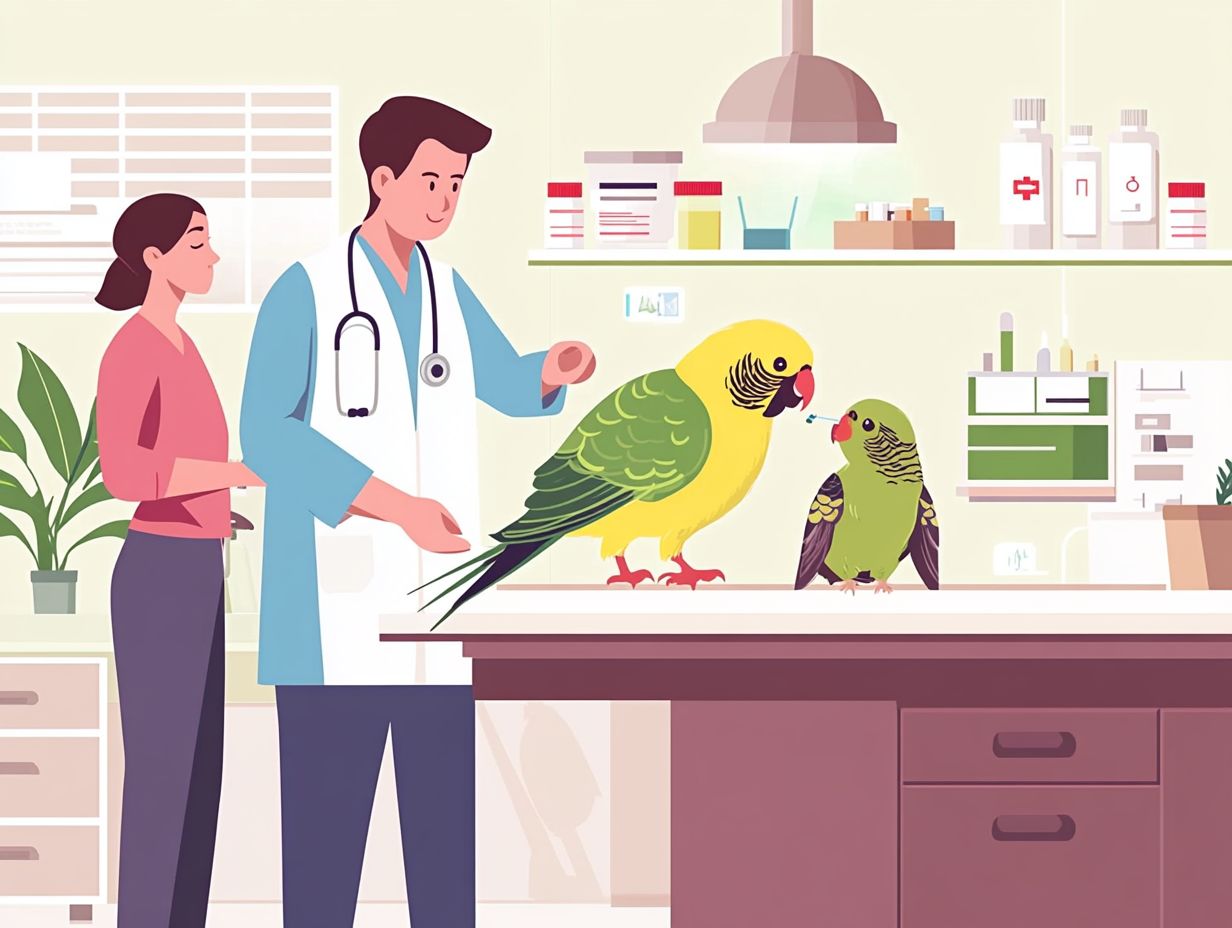
Bird vaccinations are essential for keeping your feathered friend healthy. Here are some commonly asked questions about bird vaccinations.
Why Do Birds Need Vaccinations?
Like other pets, birds can catch various diseases that vaccinations can prevent. Vaccinations can keep your bird safe from serious illnesses!
What Diseases Can Bird Vaccinations Prevent?
Bird vaccinations can prevent several diseases, including avian influenza, avian polyoma, and psittacosis. These illnesses are caused by harmful viruses and bacteria.
When Should I Get My Bird Vaccinated?
Vaccinations should begin early in your bird’s life, typically at 3-6 weeks for some diseases. Staying up to date with booster shots is crucial for continuous protection.
Are There Any Risks Associated with Bird Vaccinations?
Although rare, some potential risks include mild side effects or allergic reactions. However, the benefits of vaccinations greatly outweigh these risks.
Do All Birds Need to Be Vaccinated?
Yes, all birds should receive necessary vaccinations to protect them from preventable diseases. This includes pet birds and those used for breeding or exhibition.
Can I Administer Bird Vaccinations Myself?
No, bird vaccinations should only be given by a licensed veterinarian. This ensures the vaccinations are administered correctly and your bird receives the right dosage.
Make sure to consult your vet for tailored vaccination advice!



